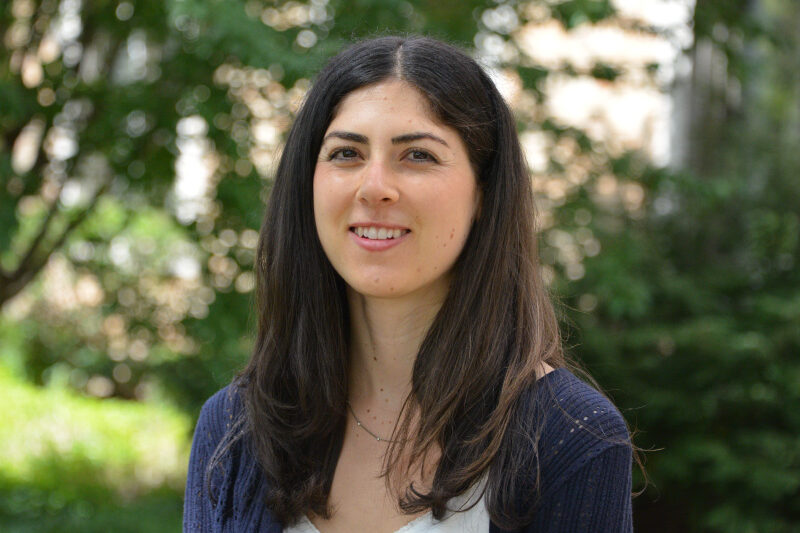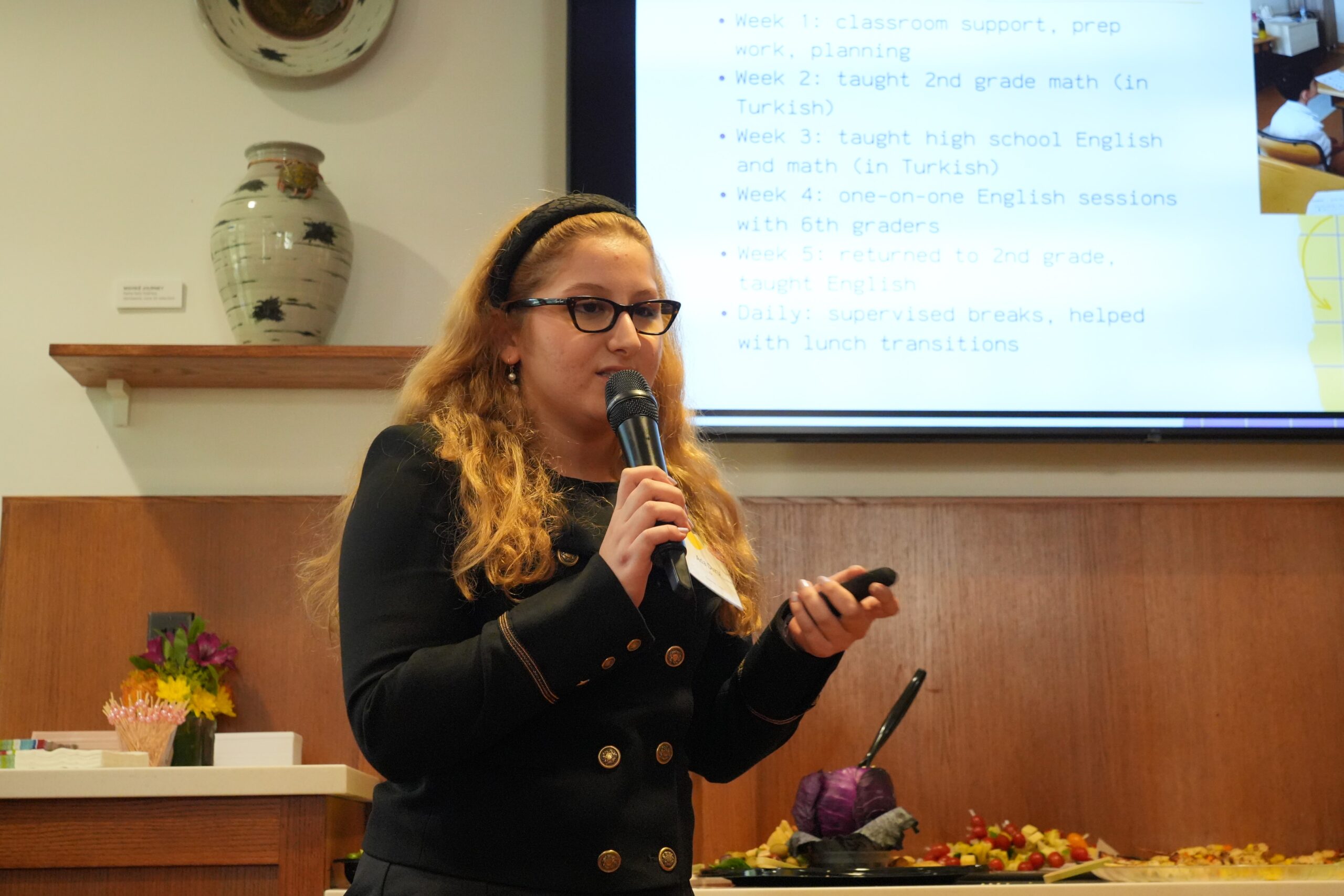Research for the Common Good Symposium celebrates students’ summer research
September 30, 2024
What does nature have to do with religion? How can communities better integrate refugees? How do healthcare policies affect rates of undiagnosed disease among low-income patients?
More than 225 students investigated research questions like these through Institute for Social Concerns summer programs this year. Six students from the institute’s two signature summer programs — NDBridge for rising sophomores and Social Concerns Summer Fellowships for rising juniors and seniors — presented their research on September 19 at the Research for the Common Good Student Symposium and Andrews Family Reception.
Brett Foster, a junior majoring in neuroscience and minoring in foundations of business, discussed his Social Concerns Summer Fellowship in Lima, Peru. Working with the Congregation of the Holy Cross, he taught special education classes, assisted in a health clinic, taught English to fifth graders, and helped children with disabilities with their physical therapy.
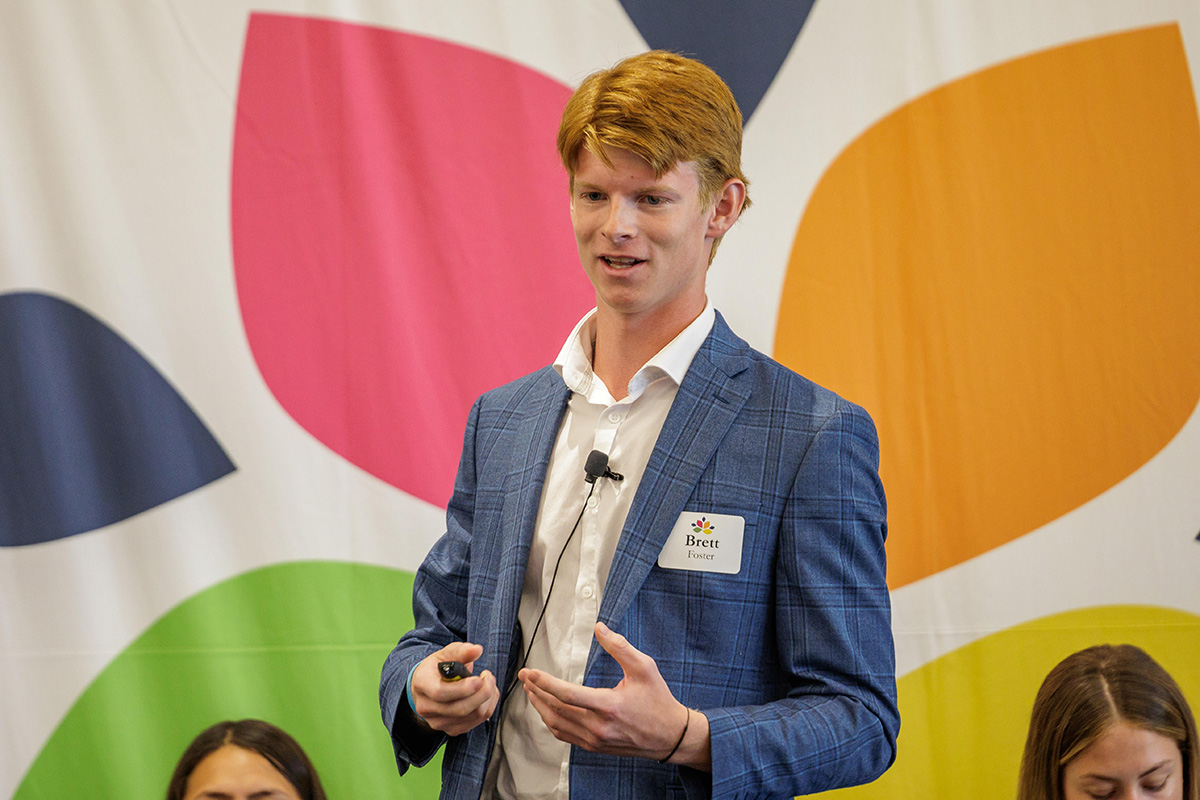
For his research question, Foster investigated how having a dependent with disabilities affects the mental health of caregivers experiencing extreme poverty. Through interviews with 18 caregivers, he saw the stress experienced by those who were taking care of a dependent alone without the support of other family members. “Most of the mothers said they had never spoken to anybody about the things I was asking them in interviews, and almost all of them said it felt good to do so,” he said.
Foster brought his observations to the director of the center for disabled children where he was working and raised the idea of creating a support group for the caregivers.
“I went all the way to South America to recognize this problem of support — something that is not localized to just this district of Peru; it’s everywhere,” he said.
Combined, the students who participated this year in NDBridge and Social Concerns Summer Fellowships worked with 75 nonprofit organizations in 41 locations throughout the United States and 66 cities around the globe.
As students worked with those organizations during the summer, they developed a research question that responded to a need in the community and collaborated with the community partner on that research. Students also received mentorship from Notre Dame faculty members. This year, 67 faculty from across campus worked closely with students before, during, and after their summer experiences.
The research component of NDBridge and Social Concerns Summer Fellowships aligns with Notre Dame’s dedication, as a university, to the pursuit and sharing of truth for its own sake. In its commitment to research for the common good, the Institute for Social Concerns incorporates the Catholic social teaching principles of human dignity, solidarity, and subsidiarity — all of which are practiced by students in the institute’s programs.
Emily Garvey, an assistant director of the Institute for Social Concerns who works primarily in the area of justice education, explained, “We want students to ask why there is a need for the organization in the community where they’ve been placed. What social structure failed or is in need of support such that people in communities need that organization? What might responses be that promote community flourishing? And what role might the students play in those responses?”
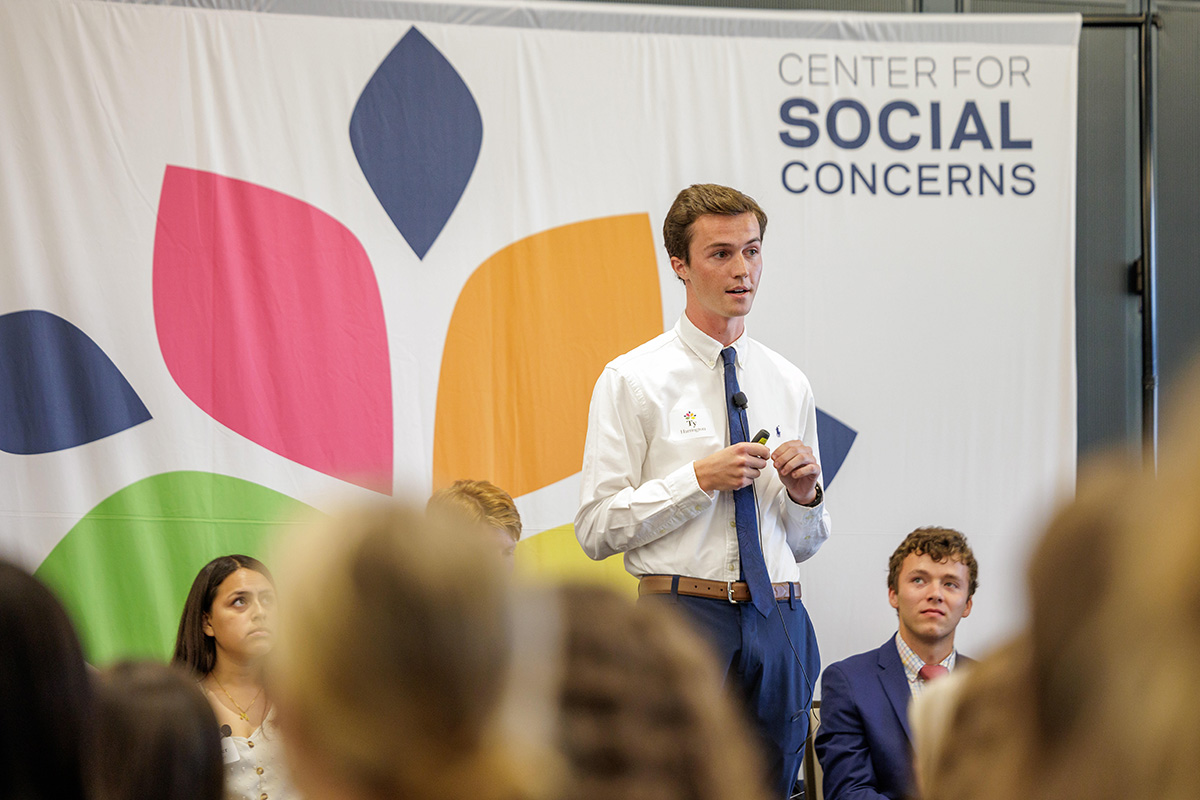
Five other students shared their research at the symposium on September 19. Three worked alongside communities internationally, two collaborated with partners here in the United States.
Ty Harrington, a junior majoring in the Program of Liberal Studies, spent the summer as a research intern on the sustainability team at Govardhan Ecovillage in India. Seeking answers to the connection between spirituality and sustainability, he went to religious festivals in Indian villages, tended to sacred cows, and had conversations with the 50-plus monks who live at Govardhan as well as visitors who go there for sustainable education and spiritual nourishment.
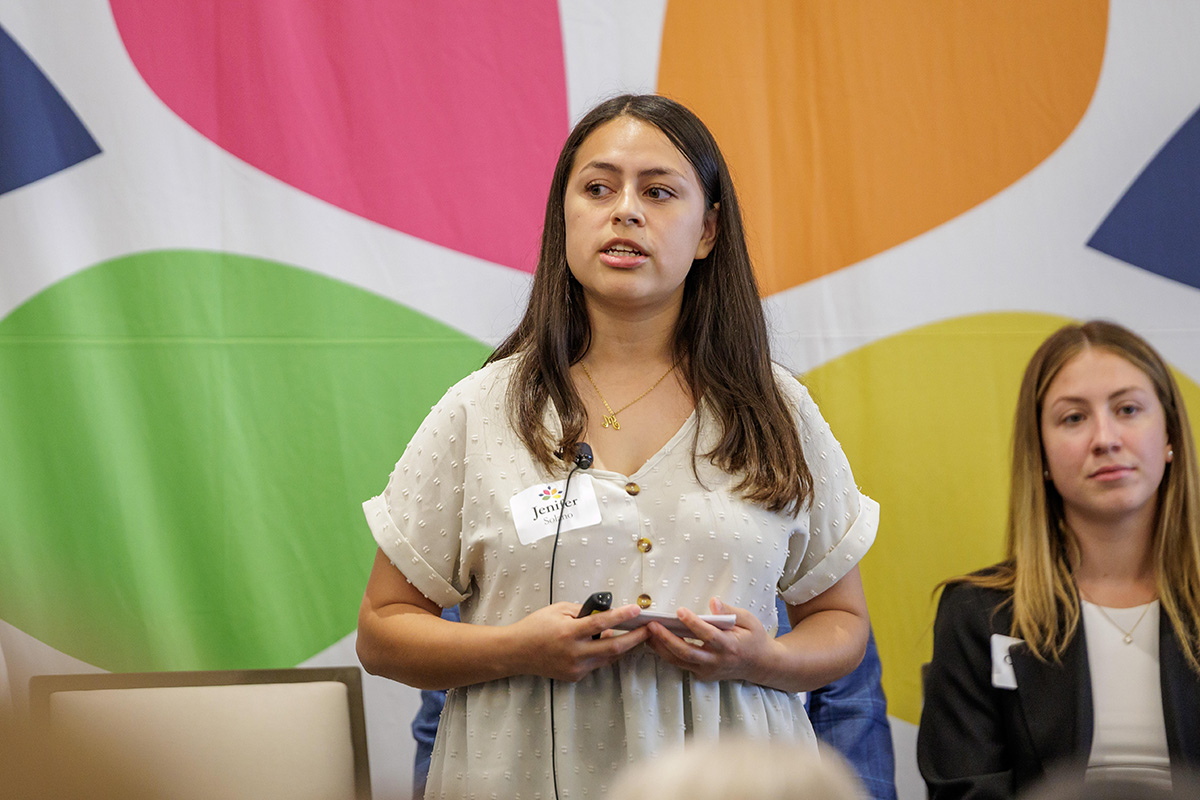
Jenifer Solano, a sophomore majoring in neuroscience and minoring in chemistry, worked with Accompanying Returning Citizens with Hope (ARCH) in Columbus, Ohio, through NDBridge. Her research examined the extent to which targeted outreach and education initiatives effectively address the challenges of food insecurity among the formerly incarcerated.
“At ARCH I encountered a group of people whose life journeys were anything but linear,” Solano said. “Many came from backgrounds marked by incarceration, poverty, neglect, and addiction. While society may too often turn and judge these individuals due to their difficult past and the stigma surrounding them, my time at ARCH revealed a profound truth: These are the most humble and resilient people I have ever met. Witnessing their unwavering optimism and hearing their stories is something I am so grateful to have been a part of.”
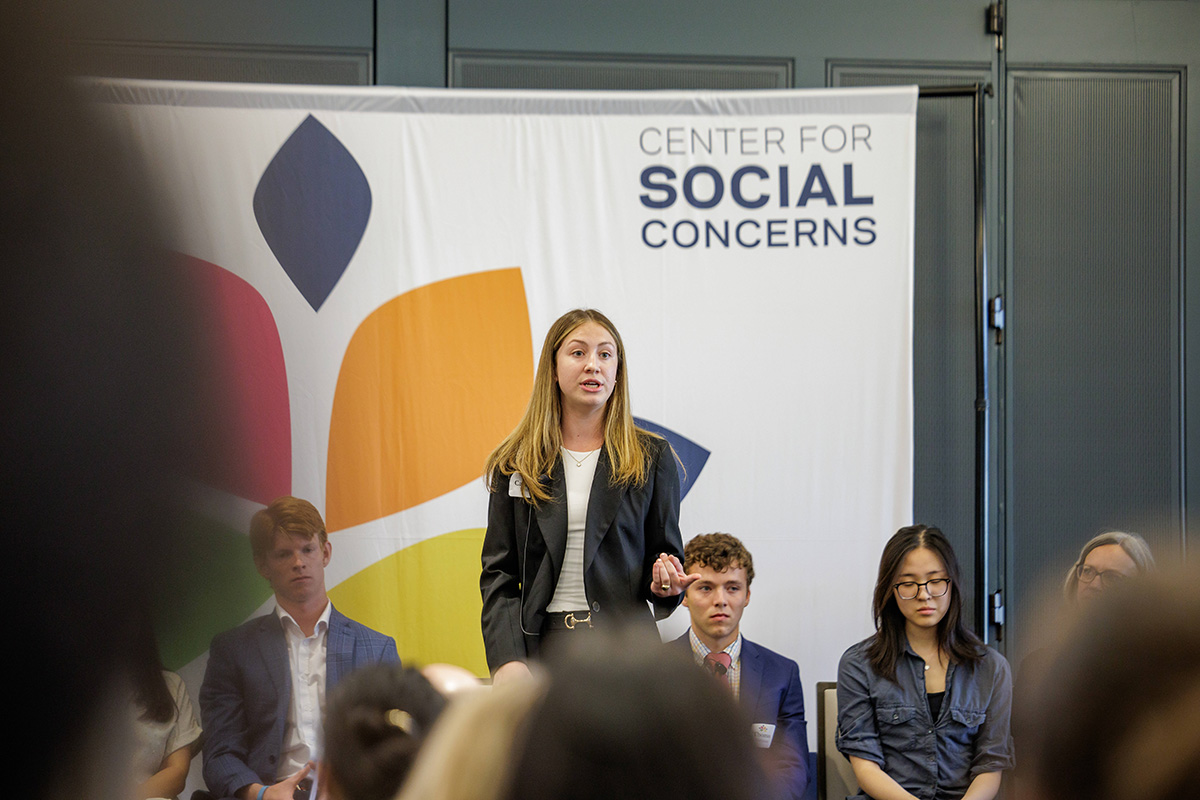
Caroline Petrikas, a sophomore majoring in political science and minoring in foundations of business and constitutional law, worked with FORUM in Letterfrack, Ireland, through NDBridge. FORUM assists vulnerable populations, including Ukrainian refugees who have recently moved to Ireland. She worked in a food pantry, with after-school programs, meals on wheels, and in the area of migrant assimilation. Her research looked at what factors help and hinder the integration of Ukrainian refugees into Irish society.
Thomas Mazzurana, a junior majoring in business analytics and theology, participated in a Social Concerns Summer Fellowship with Bethany Land Institute in Bombo, Uganda. The institute works with people experiencing rural poverty to combat environmental degradation and food insecurity. While planting crops, weeding, harvesting, and working with farm animals, he investigated how integral ecology can rejuvenate both the human soul and the economy.
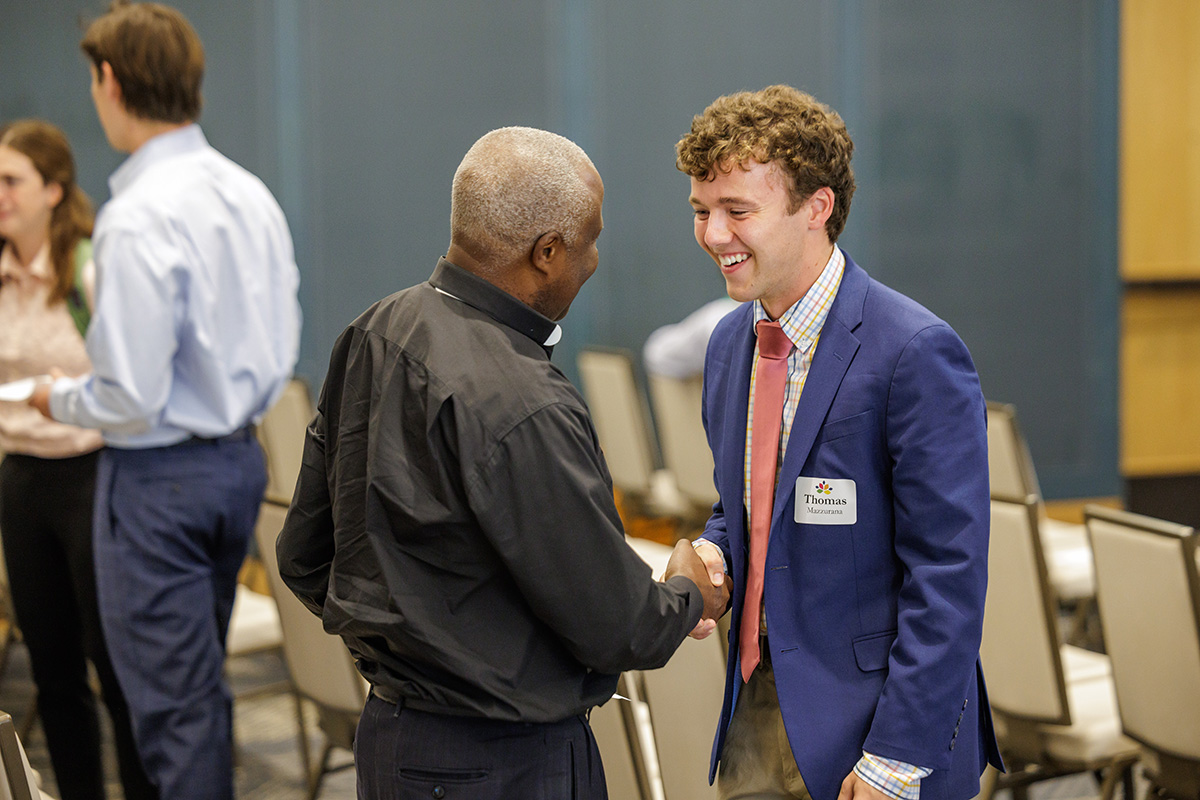
Sydney Park, a sophomore majoring in neuroscience and minoring in peace studies, worked with Alliance for Positive Change in New York City through NDBridge. The organization helps people living with chronic health conditions with health care, housing, harm reduction, coaching, and economic mobility. She worked at free testing pop-ups for HIV and Hepatitis C, at syringe exchanges, and at outreach offices around the city. Her research question asked how inequitable policies in healthcare spaces affect low-income patients’ advocacy and contribute to increased rates of undiagnosed HIV and Hepatitis C.
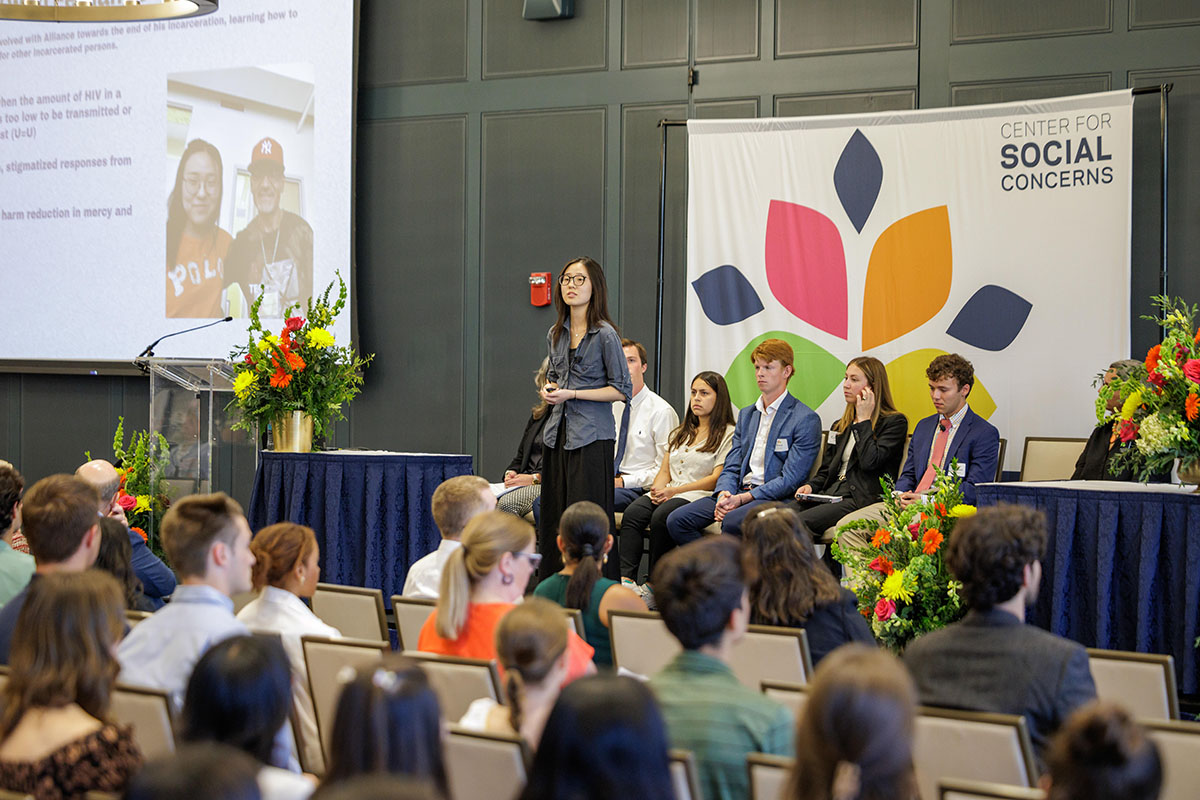
As Park finished her presentation, she noted that she plans to continue researching this topic beyond her NDBridge experience. All six students who spoke at the symposium will receive funds to continue their research next summer.
“With my future research I hope to contribute to this growing movement of community organizations such as Alliance receiving the proper recognition and credibility that they deserve in order to facilitate a more equitable truly holistic collaboration between traditional healthcare spaces, academia, and community organizations such as the one I worked with this summer,” she said.
The Institute for Social Concerns has offered immersive summer programming to Notre Dame students since its founding in the early 1980s. Supported by the extraordinary generosity of Andrews and McMeel families, thousands of Notre Dame students have had experiences that have transformed their personal and professional trajectories while working toward the common good alongside community organizations around the world.
Learn more about NDBridge and Social Concerns Summer Fellowships. Applications for both programs open on November 15.
Related Stories
-
ReSearching for the Common Good: Solbee Kang
-
Bridging worlds through art—Kyla Walker joins institute as international poetry justice fellow
-
The power of encounter—RISE Hometown prepares incoming students for learning in service of justice at Notre Dame
-
The beauty of everyday democracy—Institute convenes scholars, practitioners, Luke Bretherton for democracy conference
-
Catalyzing collaborations with South Bend citizens for the common good—Institute launches South Bend Citizens Collaboratory


